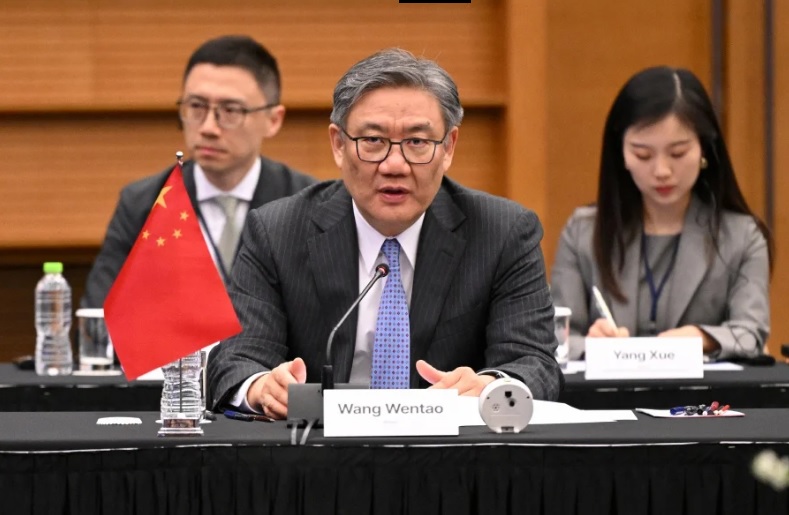
China warns that US tariffs will hurt developing countries and cause a humanitarian crisis
China cautions that US tariffs could lead to a humanitarian disaster and cause major harm to the world’s least developed and developing nations.
Wang Wentao, China’s commerce minister, informed Dr. Ngozi Okonjo-Iweala, the World Trade Organization’s (WTO) director general, that the United States’ tariffs would seriously hurt poor nations.
As Okonjo-Iweala has stated, she is still hopeful about the prospects presented by the current international trade crisis.
Insisting that tariffs will bring manufacturing back to the United States, US President Donald Trump started imposing what economists referred to as crushing global duties on foreign goods.
Analysts maintain, meanwhile, that increasing domestic production in the US would probably take years.
The “United States has continuously introduced tariff measures, bringing enormous uncertainty and instability to the world, causing chaos both internationally and domestically within the United States,” Wentao told Okonjo-Iweala over the phone on Friday.
Wentao also reminded the director of the World Trade Organization that US tariffs will “inflict serious harm” on poor countries, according to a statement released by China’s Ministry of Commerce on Saturday.
According to the statement, Wentao reminded the head of the World Trade Organization that the “reciprocal tariffs” imposed by the United States would cause significant harm to poor nations, particularly the least developed ones, and would even lead to a humanitarian disaster.
Beijing announced Friday that its 125 percent tariffs on American goods would go into force on Saturday, nearly matching Washington’s startling 145 percent taxes on Chinese goods coming into the US.
China, however, stated that it would disregard any additional tariffs imposed by Trump since it is no longer profitable for importers to purchase goods from the United States.
According to The Hindu, China also declared that it would sue the WTO over the most recent round of taxes.
Following a week of market chaos during which the two biggest economies in the world alternately erected trade barriers, Beijing rejected Trump’s increasing threats as a “joke” and a “numbers game.”
New market instability resulted from Beijing’s reprisal of 125% tariffs on US imports, which caused equities to fluctuate, gold prices to soar, and pressure on US government bonds.
Global markets are in a tailspin as a result of Washington and Beijing’s intensifying tariff war, which has sparked concerns about a long-lasting trade war between the two biggest economies in the world.
The US economy has been particularly affected by the consequences, as investors have dumped government bonds and the value of the dollar has plummeted.
Even after Beijing revealed its most recent tariff increase, Trump maintained on his Truth Social platform that “we are doing really well on our tariff policy.”
Furthermore, despite Washington and Beijing’s intense rivalry, the White House maintains that Trump is still “optimistic” about reaching an agreement with China.
In his first significant remarks regarding the tensions, Trump’s Chinese counterpart Xi Jinping said Friday that his nation was “not afraid,” according to official media.
The interruption of trade between the closely intertwined US and Chinese economies, according to economists, will raise consumer prices and may lead to a global recession.
I see this crisis as an opportunity. Okonjo-Iweala says
Okonjo-Iweala, meantime, expressed her optimism about chances in the current global trade crisis during her brief remarks at the 3rd Edition of the African Heritage Concert & Awards 2025, which took place on Saturday in the Moroccan city of Marrakesh.
One of the African icons honored for their unique contributions to positively influencing Africa’s future was the chairman of the World Trade Organization, who spoke virtually.
Speaking about the global tariff battle, Okonjo-Iweala expressed her optimism that the global economy would prevail in the end.
The US does not impose tariffs on IT imports.
In a related move, Trump’s government has declared a number of significant exemptions from its international tariffs, which appears to be a reversal of course in the trade war with China.
Smartphones, computers, and other devices will not be subject to the import taxes that President Trump implemented a week ago, according to a notice released late Friday by the US Customs and Border Protection office.
Beijing took the action in defiance of its main trading rival as retaliatory Chinese import duties of 125% on US goods went into effect on Saturday.
The exemptions will typically lessen the impact of the startling 145 percent tariffs Trump placed this year on Chinese goods entering the US, which will assist US tech titans like Apple that manufacture iPhones and other high-end products in China.
The US exclusions are “the best news possible for tech investors,” according to Daniel Ives, a senior equities analyst at Wedbush Securities.
He claimed that “the AI Revolution thesis would have been slowed significantly and the US Tech industry would have been taken back a decade” in the absence of these exemptions.
A large number of the exempted items, such as computer CPUs and hard drives, are typically not manufactured in the United States.
In a parallel move, Taiwan’s administration announced on Saturday that it had held initial tariff talks with the US and anticipated more conversations to establish “strong and stable” economic relations.
In an attempt to protect its exporters from a 32 percent duty, Taiwan’s president, Lai Ching-te, stated that the island was on “the first negotiating list of the US government.”
All Categories
Recent Posts
Tags
+13162306000
zoneyetu@yahoo.com



